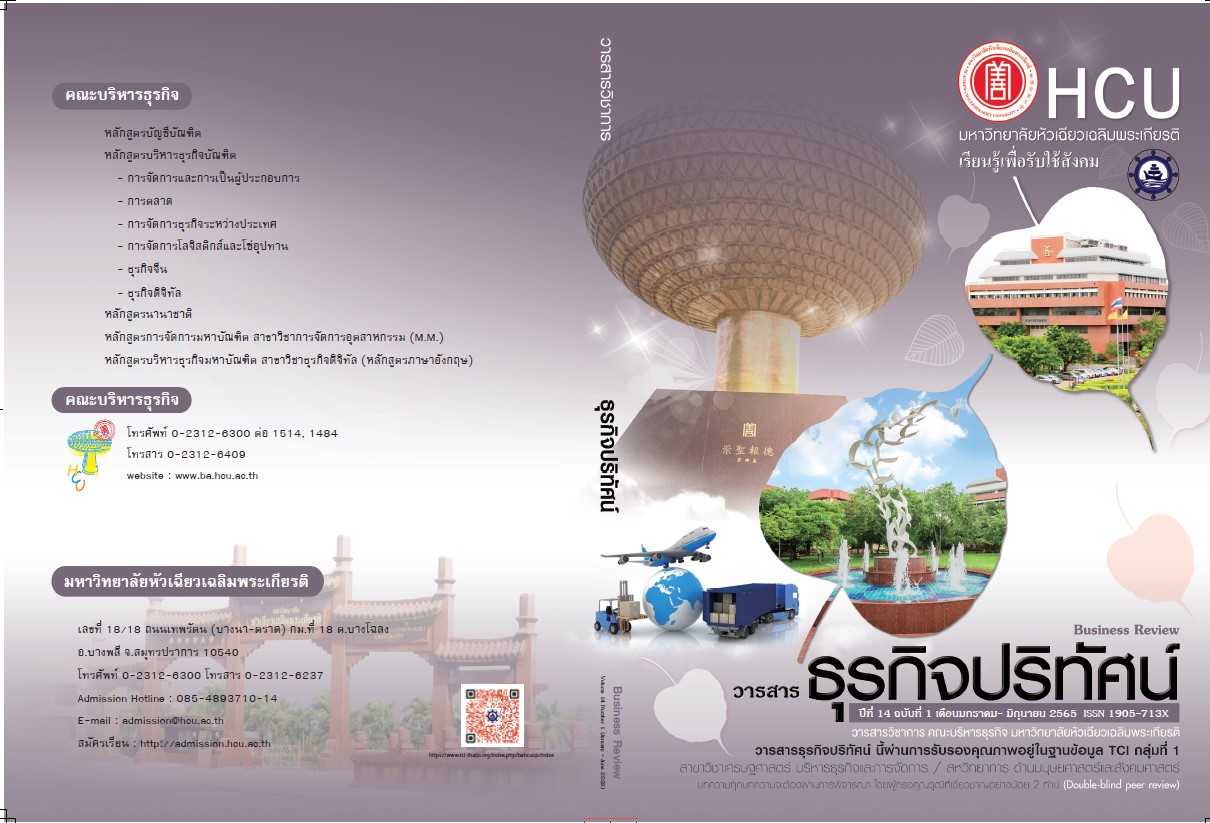Different Perspectives of Transformational Leadership
Keywords:
Leadership, Transformational Leadership, Leader, FollowerAbstract
This research aims (1) to study the perception of leaders ‘transformational leadership (2) to study the perception of transformational leadership of followers towards their leaders and (3) to compare the perception of transformational leadership between the leaders and the followers. Mixed methods which included of quantitative and qualitative research was employed. The data was collected from two sources, leaders, and followers, 28 people who worked in the same team. All of them worked as a human resource business partner. Data analysis consists of Mean, Standard Deviation (S.D.) and Thematic analysis.
The results revealed that the leaders perceived a higher score on their transformational leadership than the followers. The different between leaders and followers scores emerged because the leaders did not pay attention in listening to their followers attentively. Most leaders had a strong self - esteem and insist on their own ideas. Consequently, the leaders perceived themselves from their own aspect rather than from the followers’ point of view. Furthermore, the leaders and the followers had a dissonance viewpoint of the importance of work. These all were the causes of different perspectives on transformational leadership. As a result, it might affect relationships and work efficiency in an organization.
References
เตชทัต ใจท้วม. (2551). ความสัมพันธ์ระหว่างภาวะผู้นำแบบเปลี่ยนแปลงตามการรับรู้ของพนักงานกับ การเสริมสร้างพลังอำนาจในงานเชิงจิตวิทยาในงาน และความผูกพันในงานของพนักงาน: กรณีศึกษา พนักงานสายการบินแห่งหนึ่งในประเทศไทย. งานวิจัยส่วนบุคคลปริญญามหาบัณฑิต,มหาวิทยาลัยธรรมศาสตร์.
ทิพยรัตน์ คชพงษ์. (2551). ความสัมพันธ์ระหว่างภาวะผู้นำแบบเปลี่ยนแปลงตามการรับรู้ของผู้ตาม การ เสริมสร้างพลังอำนาจในงานเชิงจิตวิทยา และความผูกพันในงาน: กรณีศึกษาองค์การที่ไม่มุ่งหวังผลกำไรด้านมูลนิธิด้านสิ่งแวดล้อมและการอนุรักษ์ทรัพยากรธรรมชาติในจังหวัด กรุงเทพมหานคร. งานวิจัยส่วนบุคคลปริญญามหาบัณฑิต, มหาวิทยาลัยธรรมศาสตร์.
นภาพร ไพบูลย์วัฒนชัย. (2557). การรับรู้ภาวะผู้นำแบบเปลี่ยนแปลง การรับรู้ความยุติธรรมในองค์การ และพฤติกรรมการเป็นสมาชิกที่ดีขององค์การ: กรณีศึกษาพนักงานระดับปฏิบัติการของบริษัทจำหน่ายรถยนต์แห่งหนึ่ง. งานวิจัยส่วนบุคคลปริญญามหาบัณฑิต, มหาวิทยาลัยธรรมศาสตร์.
บุญธรรม กิจปรีดาบริสุทธิ์. (2549). ระเบียบวิธีการวิจัยทางสังคมศาสตร์. พิมพ์ครั้งที่ 9. กรุงเทพฯ: สำนักพิมพ์แห่งจุฬาลงกรณ์มหาวิทยาลัย.
พิชญาพร หามณี. (2557). ภาวะผู้นำแบบเปลี่ยนแปลงตามการรับรู้ของพนักงาน การเสริมสร้างพลัง อำนาจในงานเชิงจิตวิทยาและความพึงพอใจในงาน: กรณีศึกษาบริษัทขายอุปกรณ์เครื่องใช้สำนักงานแห่งหนึ่งในกรุงเทพมหานคร. งานวิจัยส่วนบุคคลปริญญามหาบัณฑิต, มหาวิทยาลัยธรรมศาสตร์.
รัตติกรณ์ จงวิศาล. (2559). ภาวะผู้นำ ทฤษฎี การวิจัยและแนวทางสู่การพัฒนา. พิมพ์ครั้งที่ 3. กรุงเทพฯ: สำนักพิมพ์แห่งจุฬาลงกรณ์มหาวิทยาลัย.
วรรณดี สุทธินรากร. (2556). การวิจัยเชิงคุณภาพ: การวิจัยในกระบวนทัศน์ทางเลือก. กรุงเทพฯ: สยามปริทัศน์.
วีรดา เวทิศกุล. (2562). การศึกษาความสัมพันธ์ระหว่างความรักและพลังขับเคลื่อนในงาน ภาวะผู้นำการเปลี่ยนแปลงกับพฤติกรรมเชิงนวัตกรรม กรณีศึกษาผู้ปฏิบัติงานด้านทรัพยากรมนุษย์ในสถาบันการเงิน. BU ACADEMIC REVIEW, 18(2), 1415.
เศรษฐพงค์ มะลิสวุรรณ. (2561). การเปลี่ยนผ่านทางดิจิทัลของประเทศไทยเพื่อนำไปสู่ Thailand 4.0 (Digital Transformation for Thailand 4.0). วารสารวิชาการ กสทช, 3(1), 23-42.
สุปัญญตา สุนทรนนธ์. (2558). ปัจจัยภาวะผู้นำการเปลี่ยนแปลง การพัฒนาทรัพยากรมนุษย์ และความพร้อมสำหรับการเปลี่ยนแปลงที่มีอิทธิพลต่อผลการปฏิบัติงานของบุคลากรในมหาวิทยาลัยในกำกับของรัฐ. วารสารปัญญาภิวัฒน์, 7(2), 28-42.
Bass, B. M., & Avolio, B. J. (Eds.). (1994). Improving organizational effectiveness through transformational leadership. Thousand Oaks, CA: Sage Publication.
Bass, B. M., & Avolio, B. J. (1990). Developing transformational leadership: 1992 and beyond. Journal of European Industrial Training, 14(5), 21-27.
Braun, V., & Clarke, V. (2006). Using thematic analysis in psychology. Qualitative research in psychology, 3(2), 77-101
Chao, D., & Xiaowan, J. (2019). The fluence of transformational leadership and team emotional atmosphere on employees’ innovative behavior. Panyapiwat Journal, 11(3), 151–162.
Eliyana, A., Ma’arif, S., & Muzakki. (2019). Job satisfaction and organizational commitment effect in the transformational leadership towards employee performance. European Research on Management and Business Economics, 25(3), 144-150.
Haynie, J. J., Kristin, Cullen, K. L., Lester, H. F., Winter, J., & Svyantek, D. J. (2014). Differentiated leader–member exchange, justice climate, and performance: Main and interactive effects. The Leadership Quarterly, 25(5), 912-922.
Northouse, P. G. (2010). Leadership: theory and practice (5th ed.). the United State of America: Sage Publications.
Schuchmann, D., & Seufert, S. (2015). Corporate learning in times of digital transformation: A Conceptual framework and service portfolio for the learning function in banking organisations. International Journal of Advanced Corporate Learning, 8(1), 31-39.
Thomas W.H. Ng. (2017). Transformational leadership and performance outcomes: Analyses of multiple mediation pathways. The Leadership Quarterly, 28(3), 385–417.
Ulrich, D. (1997). Human Resource Champions The next agenda for adding value and delivering results. United States of America. (n.p.)
Yukl, G. (1999). An evaluation of conceptual weakness in transformational and charismatic leadership theory. The Leadership Quarterly, 10(2), 285-305.
Yukl, G. (2010). Leadership in organizations (7th ed.). New Jersey: Pearson.
Zhou, X., & Schriesheim, C. A. (2010). Quantitative and qualitative examination of propositions concerning supervisor–subordinate convergence in descriptions of leader–member exchange (LMX) quality. The Leadership Quarterly, 21(5), 826-843.
Downloads
Published
How to Cite
Issue
Section
License
Copyright (c) 2022 Business Review Journal

This work is licensed under a Creative Commons Attribution-NonCommercial-NoDerivatives 4.0 International License.
All articles published in the Business Administration and Management Journal Review are copyrighted by the journal.
The views and opinions expressed in each article are solely those of the individual authors and do not represent those of Huachiew Chalermprakiet University or any other faculty members. Each author is fully responsible for the content of their own article. Any errors or issues found are the sole responsibility of the respective author.




